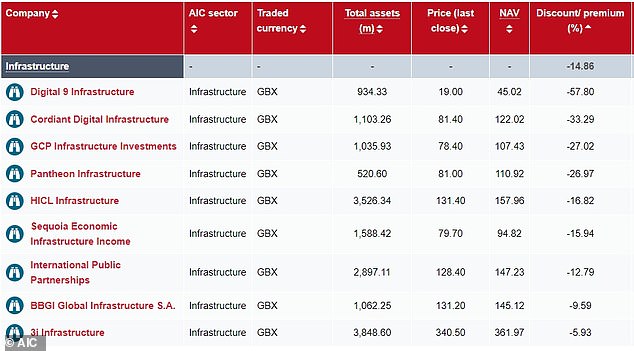Boost for investment funds as disclosure rules suspended ahead of reform
Investment funds are hoping for new capital flows after the government temporarily suspended enforcement of burdensome rules on disclosing costs.
This is ahead of a review of the regulations after Brexit. This review is part of a government growth strategy, which is aimed at, among other things, stimulating investment in the UK capital markets. These markets have lagged behind comparable markets in recent years.
Much of the UK investment trust sector has been struggling with large discounts to net asset values for some time now, meaning that the value of shares and overall valuations are lower than the sum of the underlying assets.
Big bang moment for investment trusts? London-listed funds aim for end to persistent discounts
Attempts to eliminate discounts, for example through share buybacks, have largely failed, with the industry blaming part of the disclosure requirements for consumers that were adopted after Britain left the European Union.
Trusts must disclose their costs and charges thoroughly. But the rules require institutional investors, such as pension funds or banks, to also report the costs of their investment to their underlying investors.
According to industry lobbyists, the inflow of institutional investors into investment funds has effectively stopped, as they are deterred by the relatively high amount of time and resources required.
The government says EU rules for UK investment funds and other financial sectors will be reviewed by 2025, introducing a Consumer Composite Investments regime that is better aligned with the country’s requirements.
‘Big Bang’ moment?
HM Treasury, the Financial Conduct Authority and City Minister Tulip Siddiq said in a joint statement: ‘Investment funds are a well-established type of investment vehicle in the UK, accounting for over 30 per cent of the FTSE 250 and investing in assets in excess of £260 billion.

City Minister Tulip Siddiq
“They can be a valuable source of investment financing for both conventional and emerging asset classes.”
However, the statement noted that mutual fund valuations and discounts “can be influenced by many factors beyond regulation,” such as investment performance, general market sentiment and the interest rate environment.
William MacLeod, Director of Gravis Advisory, the company behind the VT Gravis UK Infrastructure Income Fund and the VT Gravis Clean Energy Income Fund, said: ‘What has happened today is a lot less dramatic than the Big Bang of the 1980s, but for us in the industry and all investors in investment companies it is no less shocking.
‘It is a major breakthrough that is long overdue. The campaign group – helped enormously by the support and dedication of Baronesses Bowles and Altmann – has been working tirelessly for these changes for a number of years and today is a day of both relief and celebration.
“It is vital that this injustice is righted for the UK market, the sector and investors of all sizes.”
Ryan Hughes, interim managing director of AJ Bell Investments, added: ‘The unintended consequences of the current legislation have created an uneven playing field, putting investment funds at a disadvantage and in some cases even threatening their very existence.
‘Removing this unnecessary barrier will help the mutual fund industry get back on its feet and allow it to compete on an equal footing with other investment structures. This will put them back on the radar of investors who were wary of using them because of the cost disclosure requirements.
‘At a time when the government wants to stimulate investment in the UK and encourage private capital to drive economic growth, the removal of any barriers that could hinder this should be viewed positively.’
‘Lost years of investment’ for infrastructure
Companies investing in illiquid assets, such as infrastructure, are further affected by the large discounts.
High interest rates have made investors more cautious due to the higher cost of debt, the long duration of portfolios and the potential for sharp declines in asset valuations.
Research from Abrdn shows that infrastructure funds are heading into their first three-year period without raising primary capital, a move the asset manager says reflects “the dual impact of a higher interest rate environment and cost disclosure rules.”

AIC data shows infrastructure trusts have faced persistent discounting
Data from the Association of Investment Companies shows that infrastructure funds listed in London are currently trading at an average discount to net asset value of 14.9 percent, ranging from 5.9 percent for 3i Infrastructure and 57.8 percent for Digital 9 Infrastructure.
Christian Pittard, head of closed-end funds at Abrdn, said: “The new government has made stimulating economic growth – by channelling capital into areas such as renewable energy and infrastructure – its raison d’être.
‘These funds are already investing billions in these areas, delivering crucial economic growth projects.
‘However, the cost disclosure rules, which amount to a disruptive ‘double counting’ of costs, have had a negative impact on investor sentiment and have therefore slowed the flow into mutual funds.’
DIY INVESTMENT PLATFORMS

AJ-Bel

AJ-Bel
Easy investing and ready-made portfolios

Hargreaves Lansdown

Hargreaves Lansdown
Free Fund Trading and Investment Ideas

interactive investor

interactive investor
Fixed investment costs from £4.99 per month

Saxo

Saxo
Get £200 back on trading fees

Trading 212

Trading 212
Free trading and no account fees
Affiliate links: If you purchase a product, This is Money may earn a commission. These deals are chosen by our editorial team because we think they are worth highlighting. This does not affect our editorial independence.
Some links in this article may be affiliate links. If you click on them, we may earn a small commission. That helps us fund This Is Money and keep it free. We do not write articles to promote products. We do not allow commercial relationships to influence our editorial independence.
